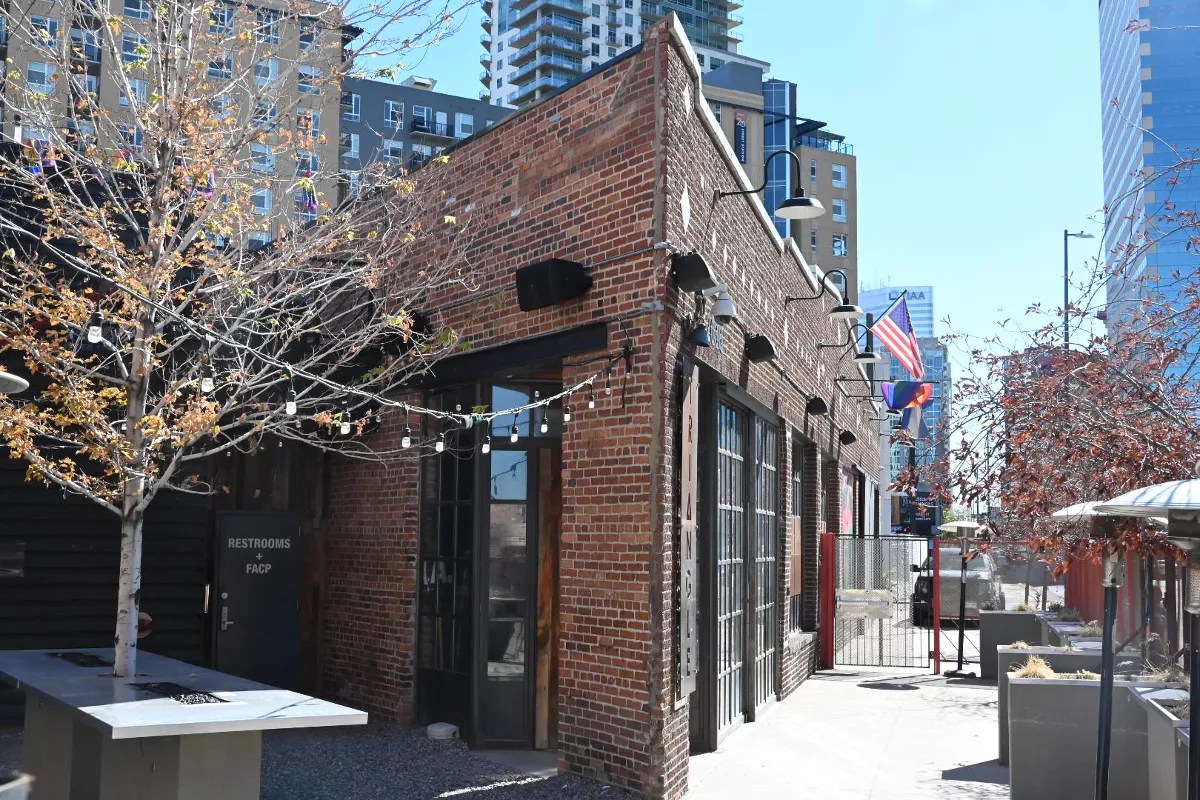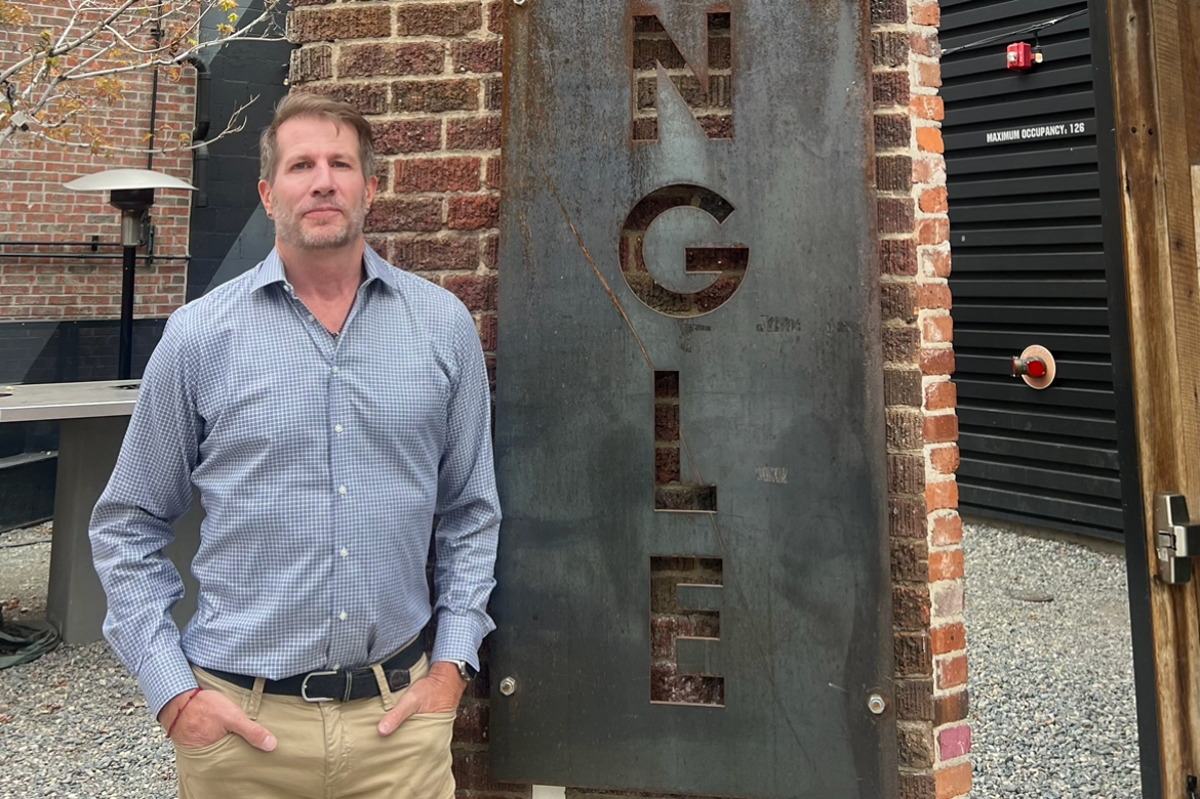
Bennito L. Kelty

Audio By Carbonatix
When Scott Coors had a chance to buy into the reopening of the Triangle Bar in 2017, he saw it as an opportunity to make his own mark on the city he loves – and maybe a chance at fortune.
“I love the history,” he says. “And it was a good opportunity to buy what we thought would be a real valuable piece of real estate.”
But that dream seemed to finally fade away this week as he and fellow owners decided to close up shop at 2036 Broadway “indefinitely” on October 5, after months of dealing with homeless encampments.
“It’s been a struggle ever since COVID,” Coors tells Westword. “We had a manageable homeless situation back there prior to COVID – it wasn’t ideal, but it was manageable. It wasn’t posing a health threat and safety threat.”
The decades-old establishment – one of the oldest and most popular LGBTQ+ venues in Denver – is set to reopen for one last bash on Sunday, October 8, before shuttering. Coors is the son of Bill Coors, who once ran Colorado’s most famous beer company, and the grandson of Adolph Coors, who founded it. He became involved in the restaurant when fellow owners Sean O’Grady, Roger Kerns and Dave Hurt resurrected the bar in 2017.
“I was sick of putting my staff in harm’s way, and I was sick of putting my customers in harm’s way,” Coors says. “It’s not safe.”
The Triangle Bar opened in the early 1970s and “was quite the dive bar,” according to Coors, who confesses, “It wasn’t really my main hangout” and “was a little seedy for me.”
Describing the atmosphere, Coors says, “It was underground and seedy back in the days when gay bars were not accepted. It was dark and dingy, and it lasted for thirty years.”
The Triangle closed in the late 2000s after the owner died from cancer, according to Coors, and a variety of small bars and restaurants tried to operate out of the wedge-shaped Triangle building. A San Diego-based restaurant company specializing in sausages bought and remodeled the space in 2014; it stayed open for less than a year. Coors bought the building through his company DASCO in October 2017 for $2.4 million; the bar reopened that December.
Under new ownership, things became “a little bit more upscale” and “more classy,” Coors says. “It was a tremendous success. We hit the ground running, and our first two years were amazing. We beat every projection; things were going well, and then COVID hit.”
The owners had “homeless problems in that neighborhood since we bought the building,” Coors claims. A homeless man was living in an alcove of the building when they bought it, and management used to pay him to shovel snow.
“He was one of the good ones,” Coors tells Westword. “He was a meth addict, but he, more than most of them, had his faculties about him.”
When COVID hit, things got “completely out of control,” Coors says.
Soon after, homeless residents moved into a fenced-off area near the Triangle Bar “and turned it into a gated community for themselves,” he says. They named the area “the Gutter House,” adds Coors. “There was a whiteboard out front posting drug deals. There was prostitution, there was trafficking going on in there, there was a murder that happened there.”
The closure in May of the Firestone auto shop, across the street at 2000 Broadway, “was the beginning of the end,” Coors charges. “When they closed, the whole sidewalk on California Street basically became full of tents. That was the main corridor people had used to come to the bar, and business dropped off.”

Scott Coors invested his money into resurrecting the legendary Triangle gay bar in 2017.
Courtesy of Scott Coors
People have become especially fearful of parking their cars near the bar, and “I don’t blame them,” Coors says.
The Triangle had been losing money “year over year” since COVID hit, according to the owner, and was dealing with a 30 to 40 percent drop in revenue so far in 2023 compared to 2022.
“Ever since the Firestone closed, every week we had probably 5 percent less people,” Coors says. “We were down 50 percent year over year before we finally pulled the trigger.”
The decision to finally close the legendary venue was based on a survey of 500 people, which found that 75 percent were visiting the business less often. Of those, more than 60 percent said they were coming less frequently because of safety fears brought on by the encampments.
“The survey was instrumental,” Coors says. “We had a lot of turmoil with the bar – we had a fairly tumultuous management change, we had changes in programming – and we didn’t know if it was something we were doing, but we just kept watching things dwindle.”
The bar’s ownership group kept trying new ways to bring customers through the doors, but “nothing was working,” according to Coors.
“The survey really helped us say customers are happy with the quality, they’re happy with the service, they’re happy with the programming,” he says. “It comes down to parking and homeless, and parking is very related to homeless.”
Over the years, the Triangle “never turned a profit,” Coors says, but the owners were still trying their best to keep everyone happy – and coming. “We were injecting money in to keep it open in hopes we would see some change,” he says. “And we literally just got tired of throwing cash into the wind.”
Homeless encampments have popped up repeatedly on different parts of the 2000, 2100 and 2200 blocks of Champa, California, Stout and Welton streets, as well as the stretch of Broadway that runs by those blocks. The encampments have affected business at the Mercury Cafe, Cheese Meat Board and the British Bulldog, among other establishments.
Certain parts of the blocks are city-designated “permanently posted cleanup areas,” according to Denver officials, which means the city needs to regularly move physical structures, such as tents, because of “extant public health issues.”
Business owners have complained repeatedly about the encampments’ effect on their establishments. Coors says he shares “a mutual frustration” with them, especially Danny Newman from the Mercury Cafe and Mark Berzins from the British Bulldog. “There’s a huge amount of frustration in the neighborhood,” he tells Westword.
Coors and some of the owners met with Denver Police Department officials, Denver City Councilman Darrell Watson and senior staff from Mayor Mike Johnston’s office in August and September to talk about the issue. “We pressured the city,” Coors says. “Darrell Watson from council stood up for us, did his very best to get a sweep to happen, and it did on the 27th [of September].”
Homeless encampments in front of and around the Triangle were cleared on that day, but Coors says that “within 24 hours” of the sweep, “tents were back” near the property.
“We called the city and said, ‘You guys need to get rid of these [again],'” Coors remembers. “Nothing. Absolutely nothing.”
Ownership and staff at the Triangle were “overjoyed” with the sweep, Coors says. “For one afternoon, we had our whole neighborhood back. It was gorgeous.”

The “Gutter House” was an encampment that was set up near the Triangle at 2000 Broadway. Business owners say it was cleared by the city on September 27.
Courtesy of Scott Coors
When Coors saw that tents were still near his business a week later, he says that was when he knew: “We’re done.”
“If the city is going to go through all that effort getting rid of this huge, huge encampment and not patrol it, forget it, it’s just going to be bad,” Coors adds. “That’s kind of when we just gave up.”
Leadership within the Denver Police Department “understood, they got it, they were sympathetic,” Coors credits. “The problem was, the mayor’s office has to authorize anything. And getting the mayor’s office to authorize anything has proven to be challenging.”
Coors admits that the Hancock administration did less to solve issues involving homelessness, but he believes Johnston needs to do more than what’s been done so far.
“The prior administration let the city go completely in the toilet,” Coors says. “The new mayor has had very little time to rectify the situation, but I don’t get the impression he’s listening when we say that we’re about to close.”
Coors’s impression, he says, was that Johnston’s staff thought mentions of the Triangle’s closure before it happened “were idle threats.” But the mayor’s staff has since called him “to apologize for things that haven’t happened,” he tells Westword.
“They’re acknowledging and they’re figuring out that yeah, this is a problem and businesses are going to close,” Coors says. “And that’s squarely on the city for not enforcing its codes and its policies.”
While the length of the closure is indefinite, Coors says: “I have no interest in dealing with the city any more after this experience.”
The defeated owner has been in discussions with “a couple different parties” who are interested in reopening the Triangle “if the area can get cleaned up. But they’re not going to touch it while it’s the way it is,” he says.
“If the area gets cleaned up, I think there’s a possibility somebody will bring it back,” Coors adds. “But I’m pretty confident it’s not going to be me.”
The Triangle’s last bash – aka the “Farewell Beer Bust” – is scheduled for Sunday, October 8, at noon. Wristbands were set to go on sale at 4 p.m. Friday, according to management; the kitchen will be closed and the bar is “very short staffed,” according to the email announcement, but will try its best.
“We had an amazing customer base,” Coors says. “They just weren’t coming anymore, and I don’t blame them.”
Coors tells Westword he’s been getting hate mail from people who call him “anti-homeless” after his decision to shutter. But he clarifies that he’s actually “anti-drug” and emphasizes that he “gives generously to homeless services organizations” whenever he can.
“We’re dealing with people who don’t want help, they’re addicted to drugs, they do it regularly on our sidewalks, and they get to live a life of immunity in the encampments,” Coors concludes. “It’s not a homeless problem, it’s a drug problem.”